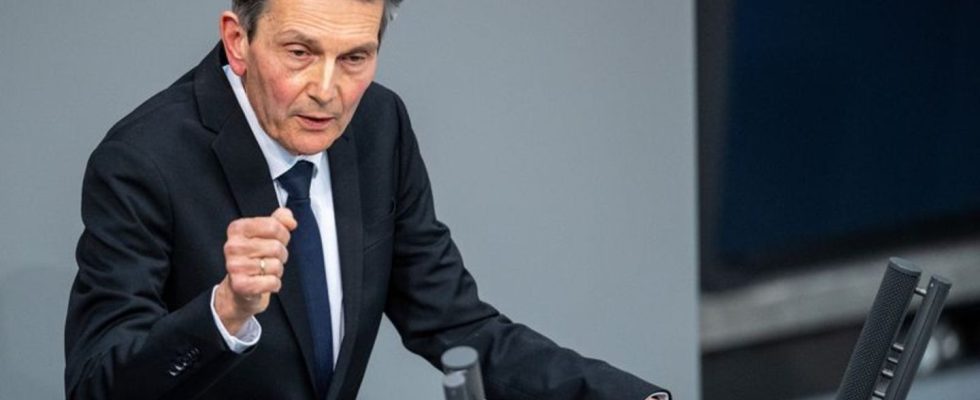SPD parliamentary group leader
Mützenich dissatisfied with budget deal
SPD parliamentary group leader Rolf Mützenich warns of a division in society because of the savings. photo
© Melissa Erichsen/dpa
The coalition’s painstakingly reached agreement on an austerity package continues to be discussed. SPD parliamentary group leader Mützenich wants to suspend the debt brake again. His party leader, on the other hand, is finally calling for unity among the traffic light parties.
Dissatisfaction with the budget compromise of the traffic light leaders in the government parties continues. SPD parliamentary group leader Rolf Mützenich has now called for the debt brake to be suspended again for the coming year and otherwise warned of a division in society. At the same time, he made it clear on Thursday that he was fundamentally not particularly happy about the compromise. SPD leader Lars Klingbeil, however, criticized the coalition partners’ withdrawal from the agreement.
“We don’t live in normal times. Wars violate all normality,” Mützenich told the editorial network Germany (RND/Thursday). He classified the risk of another lawsuit before the Federal Constitutional Court as justifiable. Mützenich made it clear on Deutschlandfunk that he doubted that there would be much of a sigh of relief over the agreement. “Because those who were involved in it questioned it relatively quickly. Now it has to be addressed in parliament.”
In the dispute over the 2024 federal budget, the leaders of the traffic light coalition have decided that the debt brake will not be generally suspended next year. However, an exception for flood relief in the Ahr Valley is currently being examined. Because of the war in Ukraine, the debt brake should not be suspended for the time being. The coalition reserves the right to take such a step only in the event of a significant change in the situation.
What is in the Basic Law?
The Basic Law stipulates that the debt brake can be suspended in the event of natural disasters or other exceptional emergencies if the state’s financial situation is significantly impaired. In particular, the FDP with Finance Minister Christian Lindner has so far been very reserved on the topic. The debt brake was recently suspended again for the current year – for the fourth time in a row.
SPD parliamentary group leader Mützenich pointed out several imponderables with regard to the Ukraine war in the RND. How Russia continues its war, which countries continue to support Ukraine and whether the USA is still there – all of this is beyond the influence of nation-state actions. Germany has much more to come than further arms deliveries. Mützenich mentioned help with reconstruction and economic issues.
“Because we are not allowed to continue making savings in the core budget, we will have to finance these additional funds through the exception regulation under Article 115 of the Basic Law – i.e. by suspending the debt brake.” To him, justifying this decision with aid to Ukraine appears to be constitutional.
What concerns does Mützenich have?
“We are in great danger of social division if aid to Ukraine is provided at the expense of important expenditure that is also important for people at home,” said Mützenich. The SPD politician pointed out that the currently planned approach would lead to “domestic distribution conflicts in which one is played off against the other.”
Mützenich is not the first traffic light politician to criticize parts of the budget compromise. He himself recalled on Deutschlandfunk that just a few hours after the agreement between Chancellor Olaf Scholz (SPD), Vice Chancellor Robert Habeck (Greens) and Finance Minister Christian Lindner (FDP) there had been a correction and the plan for a kerosene tax on domestic flights was replaced by an increase in ticket tax.
There are also movements in the coalition to withdraw from the agreement on other points: In view of violent farmers’ protests, Green Agriculture Minister Cem Özdemir opposed the agreed end to tax breaks for agricultural vehicles and FDP parliamentary group leader Christian Dürr. Associations and opposition politicians complained about cuts, particularly in the social sector.
What is climate money all about?
SPD leader Klingbeil particularly rebuked Özdemir in the Berlin “Tagesspiegel” (Thursday) – without mentioning him by name. “It doesn’t contribute to a better political situation when ministers question the budget compromise five minutes after it was reached. The way I learned politics is that once an agreement has been found, you defend it and work together to promote it,” said Klingbeil.
At the same time, he called on Finance Minister Lindner to think carefully about how the climate money agreed in the coalition agreement can be introduced to relieve citizens of the rising costs of climate protection. “The mechanism for paying it out is incredibly complex, I know that. But I still expect the Ministry of Finance to work intensively on implementation now,” he said. He reiterated a recently made suggestion: “As long as that is not possible, we must examine alternative relief options such as increasing the commuter allowance.”
The consumer advice centers demanded climate money of 139 euros for every citizen. Since 2021, consumers have been paying a surcharge on gas, oil and fuel due to the CO2 price without receiving sufficient relief in return, argued Thomas Engelke from the Federal Association of Consumer Organizations on ARD. The CO2 price will continue to rise next year. “We demand that the government does everything it can to ensure that climate money comes as quickly as possible.”
But according to the consumer advice centers, this doesn’t work. The government’s total revenue from the CO2 price is significantly higher than direct relief.
Interview (paywall)

